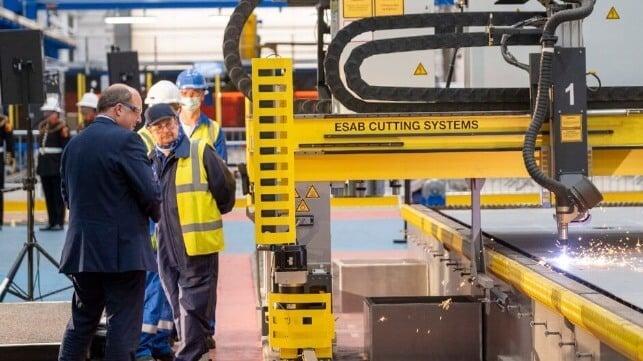Strike Threatens Production Schedule of Royal Navy's Type 31 Frigates

UK industrial union Unite is organizing an extended strike at Babcock's Rosyth dockyard in Scotland, threatening to slow production on the Type 31 frigate for the Royal Navy.
Beginning April 17, Unite members who work for subcontractor Kaefer will down tools for up to 12 weeks in protest of the employer's offer for a 7.2 pay raise. Inflation in the UK is running at nearly 14 percent, the union noted. More than 98 percent of workers balloted voted in favor of a strike. The action covers contract painters, cleaners, scaffolders and support service staff.
"Unite’s members working for Kaefer are determined to secure a fair pay deal. Kaefer dragged their feet and then made an unacceptable offer following our members’ emphatic decision to vote for strike action," said Unite general secretary Sharon Graham in a statement.
The Type 31 frigate is a light general-purpose frigate designed to be an affordable alternative to the Type 26 anti-submarine frigate design. Its capabilities are intended to be sufficient for anti-piracy and escort operations. The warships will not be delivered with vertical launch system cells, but are designed to be compatible with VLS systems if needed in a later retrofit. Babcock holds a $1.5 billion contract for the construction of five hulls, and steel has been cut for the first two; first delivery is slated for 2028.
The Type 31 design is modular to allow the involvement of multiple shipyards, as practiced in the construction of the HMS Queen Elizabeth class aircraft carriers. It is also oriented towards export sales, and Babcock has developed a full package of technical assistance and support (dubbed ArrowYard) to help foreign shipbuilding customers to build their own Type 31s locally. Poland has signed up for three warships based on the Type 31, to be called the Miecznik-class; Polish contractor PGZ is getting ready for the project by supplying Type 31 blocks to Babcock for construction of the Royal Navy's five hulls, according to The Telegraph. The number and size of the ship blocks have not been confirmed, but the disclosure touches on the controversial practice of allowing foreign-assembled steel in Royal Navy procurement.
"We understand that Babcock has contracted PGZ Poland to construct blocks for HMS Active, the second Type 31," confirmed the UK Ministry of Defence. "This represents less than one percent of the total value of program build and is part of Babcock’s aim to maximize knowledge exchange to benefit both the UK’s Type 31 and Poland’s Miecznik frigate builds."
The ministry has previously denied rumors that there might be a possibility of canceling the Type 31 in an upcoming budget review. "We are absolutely committed to building the Type 31s and the reason for that is because it is such a capable and modern ship, so it’s adaptable which means you no longer find yourself in a situation where you’ve got some incredibly expensive bit of kit doing humanitarian work," explained defense minister Alex Chalk in January.
